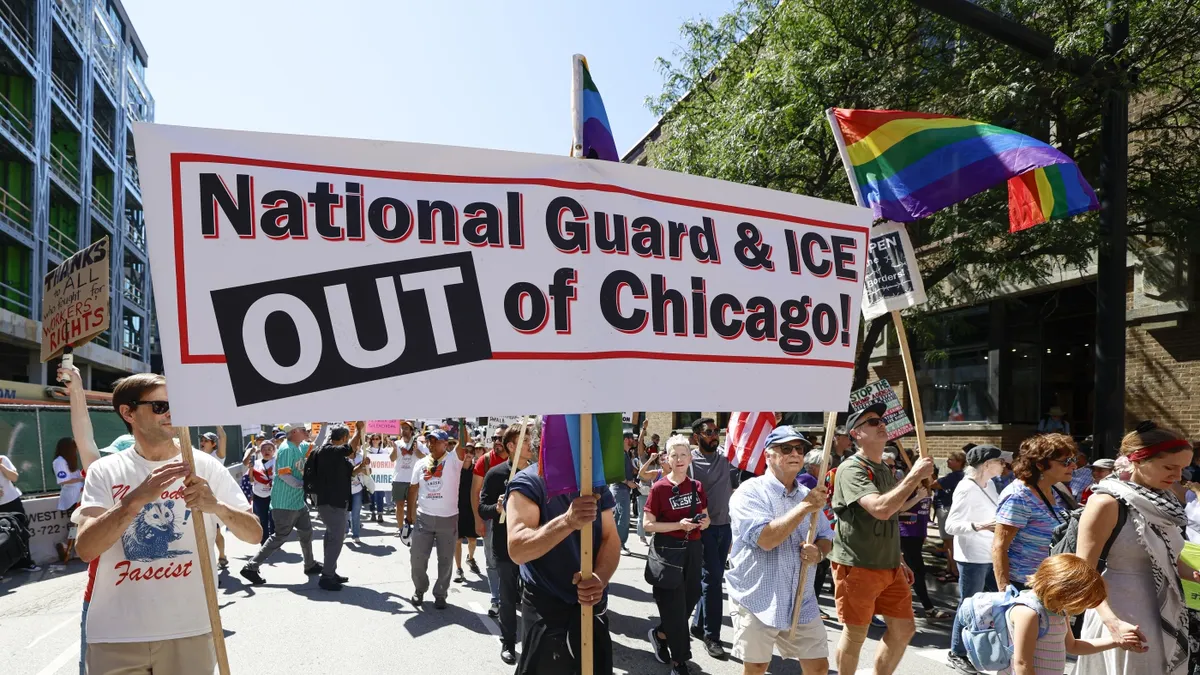
President Donald Trump is intensifying his threats to deploy the National Guard in various cities across the United States, despite a recent federal court ruling against such actions in Los Angeles. On Tuesday, a federal judge in San Francisco determined that Trump's June deployment of National Guard troops to L.A., aimed at managing protests against immigration raids, violated the Posse Comitatus Act. This act restricts the military's involvement in domestic law enforcement. Although this ruling currently applies only in California, it has not deterred Trump from considering troop deployments in cities like Chicago, Baltimore, and New Orleans, where crime rates show a downward trend.
During a press conference, Trump stated, "Well, we're going in — I didn't say when, we're going in," referring specifically to Chicago. He insisted that this move is not politically motivated but rather a matter of obligation. A U.S. official, who requested anonymity, confirmed to NPR that the Department of Homeland Security (DHS) is seeking assistance from the Pentagon for ICE enforcement operations in the Chicago metropolitan area. This request includes logistical support and the use of facilities at Naval Station Great Lakes, located approximately 30 miles north of the city.
Illinois Governor JB Pritzker, a Democrat and vocal critic of Trump, condemned the potential deployment, arguing that it is not about crime-fighting but rather a strategy to test Trump's power and create political drama to distract from his administration's issues. Pritzker stated, "We are ready to fight troop deployments in court and will ensure that agents operate legally and ethically within our state." The distinction between sending ICE agents for immigration enforcement and deploying National Guard troops for crime control is significant, especially as crime rates in cities like Chicago have been on the decline.
Trump has the authority to deploy the National Guard in Washington, D.C., under the Home Rule Act, as he did last month, despite declining crime rates in the area. Following that deployment, Trump declared D.C. a "crime-free zone," even though data indicates that while violent crime has decreased, it is not entirely eliminated. The National Guard's presence has been controversial; D.C.'s Attorney General has initiated legal action against the Trump administration, claiming the military is being misused for local law enforcement.
In contrast to the Republican governor of Louisiana, who has expressed support for Trump's proposed National Guard deployment in New Orleans, the Democratic governors of Illinois and Maryland are staunchly opposed. Given that state governors control the deployment of National Guard troops, Trump's actions could lead to further legal challenges in states governed by Democrats.
Legal expert Stephen Vladeck from Georgetown University observed that Trump might attempt to invoke rarely used statutes like the Insurrection Act to deploy troops without a governor's consent or seek to federalize the National Guard under Title 10. According to Vladeck, this situation raises critical questions about whether Trump can send troops into states without their governors' approval. Such actions would likely lead to litigation and could ultimately reach the Supreme Court, highlighting the legal complexities surrounding the deployment of military forces in domestic situations.
In Chicago, Trump's focus on violent crime has prompted officials, including Homeland Security Secretary Kristi Noem, to discuss increasing law enforcement presence in the city, primarily for immigration-related purposes. Governor Pritzker has warned that Trump may dispatch unidentified agents in unmarked vehicles to raid Latino communities around the time of Mexican Independence Day celebrations on September 16. In response, community organizers have taken precautions, such as postponing a nearby parade due to safety concerns.
Pritzker criticized Trump's suggestion that he should request troop assistance, labeling it an insult to citizens. Chicago Mayor Brandon Johnson also denounced the potential deployment, asserting that crime is decreasing in the city and that if Trump genuinely aimed to address crime, he would not cut federal funding for violence prevention programs. In a counter-move, Johnson signed an executive order preventing the Chicago Police Department from cooperating with federal immigration enforcement or military personnel on patrols.
Trump has similarly threatened to send troops to Baltimore, which he described as one of the "most unsafe places anywhere in the world." However, Baltimore Mayor Brandon Scott has pointed out that homicides are down 28% this year, reaching record lows. Scott has criticized Trump's threats as a political tactic, questioning why such action was not taken during his first term when crime was higher. He emphasized the city's preparedness for any potential deployment, including possible legal actions.
In New Orleans, Trump has suggested sending troops to a more welcoming red state. Louisiana Governor Jeff Landry has publicly welcomed Trump's potential assistance, stating, "We will take President Trump's help from New Orleans to Shreveport." However, local leaders have responded with skepticism, emphasizing a substantial reduction in crime and accusing Trump of employing scare tactics for political gain.
City officials and U.S. Representative Troy Carter have urged Trump to reconsider his approach, arguing that militarizing the streets is not the solution to public safety. Instead, they advocate for federal support in recruiting and training police officers and addressing the root causes of crime. Carter's comments underscore the need for resources that tackle systemic issues rather than political maneuvers.
As the situation develops, the potential for legal battles, public protests, and political ramifications remains significant, illustrating the complexities of deploying the National Guard in response to crime and immigration enforcement across the country.